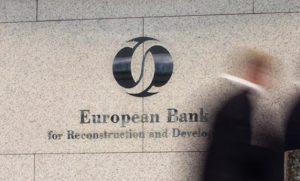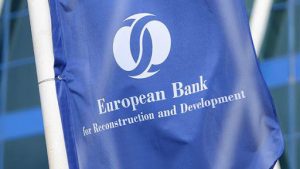
The European Bank for Reconstruction and Development (EBRD) will provide a long-term loan of up to $81 million to Kryvyi Rih Industrial Gas LLC, a Joint Venture with majority ownership by Air Products & Chemicals Inc,. a company registered in the United States, and ArcelorMittal.
The decision was made by the EBRD board on Wednesday, EBRD Senior External Relations Advisor Anton Usov has told Interfax-Ukraine.
According to a posting on the bank’s website, subject to the finalization of commercial agreements, the company will design, construct and operate an on-site air separation unit to be located in Kryvy Rih. The project will employ modern, state-of-the-art technology to safely and reliably produce industrial gases, for ArcelorMittal Kryvyi Rih steel works (Dnipropetrovsk region) and other customers in Ukraine and beyond.
The Project is expected to result in CO2 emission savings in excess of 60,000 tonnes per annum through energy efficiency gains of the steel works.
The total cost of the project is over $100 million.

The European Bank for Reconstruction and Development (EBRD) has provided Olam International Ltd. (Singapore) with a $200 million loan to finance the company’s working capital needs in Ukraine, Turkey, Egypt, Georgia and Poland.
“The EBRD loan will finance purchases of agricultural commodities such as hazelnuts, dry dairy products, grain and onions in selected countries of operation. Local subsidiaries of the company will take on the processing, storage and distribution of these goods,” the bank said on its website.
“The European Union and the TaiwanBusiness-EBRD Technical Cooperation Fund will provide donor support for the development of new methodologies and processes for climate-related risk management and stress testing in Egypt and Turkey,” it says.
Olam International is a major food and agricultural products manufacturer headquartered in Singapore.
Olam International Ltd. 53.4% is owned by Temasek Holdings, 17.4% by Mitsubishi Corporation, 7% by Kewalram Chanrai Group and 6.3% by the Olam management.
Olam Ukraine LLC was founded in 2005 and is currently the leading supplier of cocoa beans and cocoa products to large local confectioners, as well as a major exporter of grain and milk powder products.

The European Bank for Reconstruction and Development (EBRD) could provide a senior sovereign-guaranteed loan of up to EUR 53 million for the acquisition and equipping of postal vans and for the development of modern automated sorting hubs in the cities of Kyiv, Lviv and Dnipro.
According to a report on the bank’s website, the project is pending approval of the bank’s board until September 30, 2020.
Tranche 1 of up to EUR 23 million is intended for the acquisition and equipping of postal vans to be deployed in rural areas across the country and Tranche 2 of up to EUR 30 million for the development of modern automated sorting hubs in the cities of Kyiv, Lviv and Dnipro and an associated network of regional sorting depots.
According to the EBRD, the total cost of the project is EUR 102 million, which includes EUR 53 million of EBRD loan, a EUR 30 million loan of the European Bank for Reconstruction and Development (EIB) and own funds of Ukrposhta in the amount of EUR 19 million.

The European Bank for Reconstruction and Development (EBRD) is ready to continue work with the National Securities and Stock Market Commission on capital market development initiatives, the bank’s press service has said.
“We look forward to working with the securities commission on other capital market development initiatives,” Matteo Patrone, the EBRD Managing Director for Eastern Europe and the Caucasus, said.
“The European Bank for Reconstruction and Development has worked closely with the National Securities and Stock Market Commission of Ukraine on the preparation of this framework. The work was also coordinated with and supported by the International Swaps and Derivatives Association (ISDA). The EBRD welcomes the approval as an important new chapter in the development of Ukraine’s capital market,” the bank said on its website.
“The new law will contribute to the establishment of a derivatives market in Ukraine,” Patrone said.
“The new law puts Ukraine on the map for the derivatives market and for netting, allowing companies to safely and efficiently hedge their risk and exposure, thus contributing to the development of a local currency financial market,” the report says.
The EBRD is the largest international financial investor in Ukraine. To date, the bank has made a cumulative commitment of almost EUR15 billion through 466 projects in the country.

The European Bank for Reconstruction and Development (EBRD) will finance the reconstruction of the Dnipro-Mariupol and Dnipro-Kotovka roads in Dnipropetrovsk region, EBRD Senior Adviser for External Affairs Anton Usov said on his Facebook page. “The head of Dnipropetrovsk region, Oleksandr Bondarenko, and the EBRD Deputy Director in Ukraine, Mark Magaletsky, have signed an agreement to begin preparing a project for the reconstruction of roads in the region. The project cost is estimated at EUR 50 million,” he said.Procurement of goods and services for this project will be carried out in strict accordance with the rules of the EBRD after approval by the board of directors of the bank and signing the corresponding agreement.Usov said that work in this direction was launched in October 2019 in the context of the Re-Think investment forum, which was held in Mariupol (Donetsk region).

The European Bank for Reconstruction and Development (EBRD) could provide a long-term loan of $81 million for the construction of an air separation unit of Kryvy Rih Industrial Gas LLC (Kyiv), created last October by the Dutch company Krig Holdings B.V., a joint venture of American-based Air Products and Chemicals, Inc. and ArcelorMittal, in which Air Products is the majority shareholder.
“Subject to the finalization of commercial agreements, the company will design, construct and operate an on-site air separation unit to be located in Kryvy Rih,” the bank said on its website.
“The project will employ modern, state-of-the-art technology to safely and reliably produce industrial gases, for ArcelorMittal Kryvyi Rih steel works and other customers in Ukraine and beyond. By replacing existing industrial gas production on ArcelorMittal’s site, the new facility will reduce the annual energy consumption of the steel plant,” the report says.
“The air separation unit will be designed in line with the European Industrial Gas Association technological guidelines and will be among the first of its kind to be installed in Ukraine. The project is expected to result in carbon dioxide emission savings in excess of 60,000 tonnes per annum through energy efficiency gains of the steel works,” the bank said.
The total cost of the project is estimated at more than $100 million, the bank said.
It is expected that the EBRD Board of Directors will consider this project on July 22 this year.